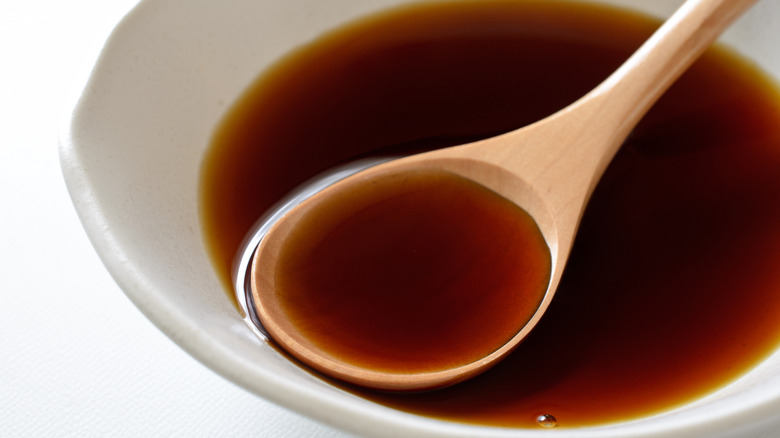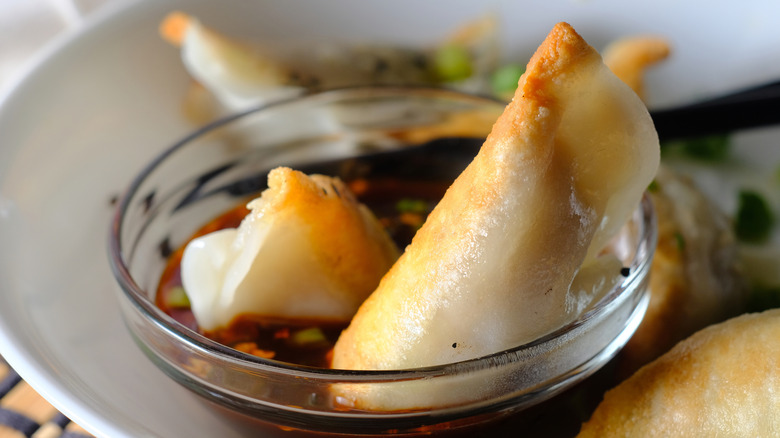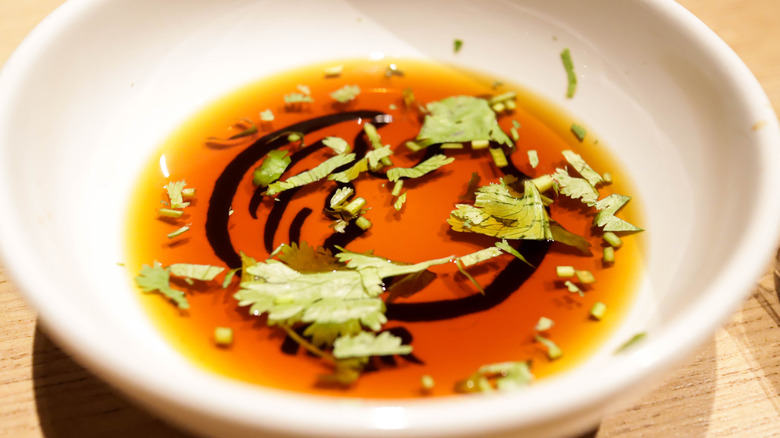Ponzu Sauce Vs Soy: How Do They Actually Differ?
Shopping for international ingredients can be an intimidating process for the curious cook. Whether you're just looking for a stir fry sauce in the "Asian foods" aisle of your local grocery store or you're making the trek to an Asian supermarket, it can be strange to be confronted with so many new products. Even in an area that seems like it ought to be easy, the soy sauce section's depth of options may surprise shoppers who are relatively new to Asian cuisines.
First off, there's the difference between light and dark soy sauce, which can be tricky to understand, especially when jumping between different cuisines. But on top of that, there are similar-looking sauces in those same bottles. What on earth is ponzu sauce — you might wonder as you stare down at yet another glass bottle of brown liquid — and how does it differ from regular soy sauce?
Well, there's a reason ponzu sauce looks a lot like soy sauce: soy sauce is the number one ingredient. Ponzu sauce is a ready-made dipping sauce or marinade which uses soy sauce as a base but adds on layers of flavor in the form of citrus juices and other ingredients like sugar, rice vinegar, mirin, fish flakes, and kombu (kelp). Citrus and umami are the dominant flavors in ponzu, but the other ingredients give it a complexity and balance that make it a favorite condiment — one you should certainly have in your culinary repertoire.
How ponzu sauce is used
The complex flavor of ponzu sauce informs how it's used in the kitchen. The combination of salty soy sauce, tangy and bitter citrus, sweet mirin, and savory fish flakes creates a complete sauce that ticks all the boxes. Unlike soy sauce, which is often combined with other ingredients, ponzu is ready to go straight out of the bottle. It's excellent as a dip for steamed vegetables, gyoza, or potstickers and it can also be used in place of soy sauce for sushi or sashimi. But the presence of citrus juice means ponzu truly excels as a marinade.
The simplest meat marinades often rely on just three ingredients: something salty to season the meat, something acidic to tenderize, and a little bit of fat to keep things juicy. While ponzu sauce doesn't contain fat, it has plenty of salt, a good amount of acidity, and loads of other flavors to impart. Japanese cuisine isn't as fat-forward as its European counterparts, making ponzu a perfect marinade for Japanese-style chicken or steak.
It can be used as is, or complemented with a touch of sesame oil for a complete marinade straight from the bottle. All you have to do is pick yourself up a bottle (like this Kikkoman Ponzu Sauce), submerge a couple of chicken breasts in it for a few hours, and then grill them up. Serve the chicken alongside steamed broccoli and rice — perhaps also drizzled with ponzu — for a complete meal bursting with flavor.
Making your own ponzu
Unlike soy sauce, which requires careful fermentation and aging, ponzu is something you can easily whip up in your own kitchen. As mentioned above, the basics of ponzu are soy sauce and citrus along with sweeteners, tangy ingredients, and umami bombs. But ponzu recipes vary; some versions use sake instead of mirin while others skip the kombu or fish flakes, among other variations. Perhaps most importantly, the choice of citrus is in the hands of the chef. All of these details mean that when making your own ponzu, there's plenty of room for creativity.
Many bottled ponzu sauces are made with lemons or limes, but you may also see bottles made with yuzu, a fragrant and bitter citrus fruit that's common in Japan. Other popular fruits include bitter oranges and sudachi. While those might not be easy to track down at your local grocer, the point is you're free to play with different ingredients here, imbuing your homemade ponzu with flavors that complement the meal you're preparing.
Similarly, there's room to explore combinations of mirin, sake, and sugar to give your ponzu a unique flavor. And while dried bonito flakes and kombu seaweed are both commonly used, it's also fine to leave out the fish and make your ponzu vegetarian-friendly. Whether you're trying to find the perfect dipping sauce for that potsticker recipe you've been agonizing over or simply looking for an easy, off-the-shelf marinade for Japanese-style grilled meats, you can't go wrong with ponzu.


